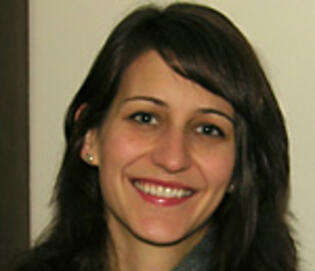
Creative Writing Award Winner - 2008
Class of 2008
Elise Resch, 08 graduated cum laude from Mount Holyoke College with a Bachelor of Arts degree in Biology and Middle Eastern Studies. From research on reproductive ritual in Islamic women’s lives and the anthropology of birth across cultures, she found her way to Nurse Midwifery. She will graduate this May to begin her career caring for women.
Listen to Elise Resch’s Hands as a netcast on Yale’s iTunesU
Transcript of the Reading:
Hands
My mother’s hands did not fit in. I was nine when we moved from Iowa to Connecticut. I had a new best friend named Heather and her mom had a polish to match every outfit. I loved the way she would tap her long nails on the mauve Formica when she was thinking. I walked home from school with Liz. Her mom had a blinding emerald and diamond ring on a shiny gold band. It was the hand she preferred to push back her perfectly frosted hair. I thought they were devastatingly fancy.
In the unforgiving light of adolescence, I decided that my mom’s hands were markedly less elegant. They were a little dry and slightly arthritic, the ring finger bore the underwhelming, humble band of two broke graduate students in english and theology. The nails were kept clean and trim and boring. A callous - from long hours correcting papers - has always lived on her left middle finger. Hands with that much evidence of utility, hands that appeared to have a function besides style and showcase, were not cool in 1985 in my narrow suburban universe.
Horrified, I realized that her hand maintenance would never pass muster with the women in our new surroundings. In fact, I dare say she had none at all - other than the occasional nail file and slather of Keri lotion. My suggestion of a manicure at the popular Pretty Nail Salon was met with a lecture on the risks of Hepatitis C transmission and the prevalence of human trafficking in such operations. She kindly indulged me with a clear gloss from time to time but she was right, it looked absurd at the end of such plain, practical fingers.
I had begun to see hands as full of information - married or single, big rock or little rock, the silicone wrap with palm trees and American flags, the bloody bitten nail, the ropey veins and sun spots - your hands said something loudly about you. A quick scan told you something of age, of class, of vanity, something of function and productivity, of stress and nerves, of relationships and commitments. At that time, in that painful search for identity, I was acutely aware of what hands could say.
At this time, in this awkward novice moment of midwifery, I am acutely aware of what hands can do. They are no longer appendages full of ultimately meaningless symbols. They have purpose and the potential to do things that matter. They give quieter, subtler messages. They distinguish a bone from a butt; they assess exit strategies in tight quarters; they clumsily attempt to measure critical distances; feel blindly for the sharp ridges of sutures; and scratch a scalp through a thick mush of caput. I use them to tell me things - about passage, about progress, about pressure. I want them steady in crisis - to trust that they will have the wisdom do something when I want to stop or stop when I want to do something. And I pray that they will do well by the women who allow their babies to fall into them.
Turns out, I have my mother’s hands - yet a bit more gnarled because I cracked my knuckles when she advised against it. They are knobby, a little stumpy, surprisingly strong yet decidedly inelegant. They are chronically dry, nails short and absent of polish, left finger recently naked of its ring. But I get it now - there is something I can only strive for in the hands of my mother - it is a beauty derived from how little they say and how much they have done.
